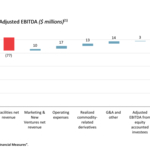Sign up for daily news updates from CleanTechnica on email. Or follow us on Google News!
In some ways, EV charging is a whole new world. Instead of needing to be located at a dedicated gas station, with big underground tanks and other infrastructure to receive shipments, an EV charging station can be placed almost anywhere. Shopping malls, restaurants, big box stores, rest areas, and just about anything goes. But that doesn’t mean that fuel retailers won’t be part of the future. After all, gas stations and truck stops serve an ICE car’s needs, but they also serve human needs.
But, what that is going to look like is still very much an open question. It’s becoming apparent that amenities are a big part of the equation, as EV drivers stick around longer. Beyond that, we really need to gain a better understanding of how the gas station business works if we want to be able to make educated guesses about the future.
Fortunately, I recently came across a great interview with a long-time gas station owner where he talks about a lot of his experiences. In this article, I’ll share the video and then get into some of the lessons we can learn from it!
There are 111,000 gas stations in the USA to serve the 40 million Americans filling up their car daily.
They are part of our culture and everyday life and we can’t function as a society without them.@gas_biz has built a storied career in the gas station industry. His stories… pic.twitter.com/GDXKhlgHMz
— Chris Powers (@fortworthchris) February 27, 2024
For Chris (aka “Gas Biz Guy”), he initially got into the business because family members were already in the business. So, he’s been in the business his whole life. When he got into high school, he decided he was done with school. Not only was it uninteresting to him, but he also struggled, possibly with a learning disability. Leaving school is a way forward that often leads to failure, but he knew what he wanted to do: run a gas station.
So, he went for it instead of going to school and made something of himself. He doesn’t recommend young people do this, because he thinks that maybe he could have done more.
He bought 25% of his dad’s gas station business and another partner bought the other three-quarters. This led to a bit of a trial by fire, where he had to “learn on the fly” and get the business going. He figured out pretty quick that he needed to cater to his customers’ needs, which meant getting into check cashing and offering ethnic foods that other gas stations didn’t stock.
I’ve personally read from different sources (including some other gas station owners I’ve known) that the money is made in the store and not on the gasoline. But, I’ve heard from bigger gas chains that the money can be made at the gas pump. Chris splits the difference, saying that it really depends on the location. Some stores can make a killing on gas. Others can’t. So, the business model needs to be personalized to the location. Some convenience stores don’t even sell gas, and still make great money.
He also emphasizes that service and location are almost as important as pricing. The perfect location for an independent gas station is in town, high density, and in front of a grocery store that doesn’t sell gasoline. This keeps his stations and those he supports free from price wars. For him, great service is something like what Wawa does: get people in and out fast, keep the place looking nice (“vibe”), and make them want to come back. Also, today stations are selling a lot of vapes, energy drinks, and phone cards.
 Chip in a few dollars a month to help support independent cleantech coverage that helps to accelerate the cleantech revolution!
Chip in a few dollars a month to help support independent cleantech coverage that helps to accelerate the cleantech revolution!
Through learning, trial, and error, he went from a station to multiple stations to being a gas station investor. But, after years of doing great, he experienced some failure in business (something that happened to a lot of people around 2008). Many people that he had invested in weren’t making money, and he ended up owing a lot of money. Eventually, things got bad enough that the mortgage company put papers on his door and he hadn’t paid for his kids’ private school tuition, so the problems had come home.
Getting out of the hole required years of grinding, doing anything he could to stay afloat. Flipping gas stations, trying new things, anything he could do. He felt like there was no light at the end of the tunnel, but he had to just keep going to not sink completely. At one gas station, the bank only didn’t foreclose due to an environmental issue that they couldn’t handle, so he was able to ride on forbearance there for a while.
Eventually, he figured out that he could make money selling ribs at that store. He passed it off as homemade sauce, but was buying barbecue sauce at Sam’s Club, repackaging it in Mason jars. Word spread that people should come from all over town to buy his “secret sauce.” Eventually, he broke out of the slump by writing a letter to a chain of gas stations offering to buy a gas station, despite having no money to buy with. But, his reputation from a separate fuel distribution business that was barely breaking even helped get him in the door.
The CEO of the stores let him know that the owner of the chain of stores had recently passed away, and they needed to sell the stores to settle the estate. He made a low offer that he didn’t think would be taken, but he beat the other offer by only $10,000. With a contract in hand, he went to a neighbor who wanted to invest in his businesses, and then went to his dad, and came up with earnest money. Then, without money to pay for the stores, he arranged the sale of four of the stores, keeping two to run outright.
In other words, the scraping and scraping paid off, and he made his way out.
There are tons of other things he says in the video about the business. It’s worth watching the whole thing, but I want to close this article by covering what he had to say about the future of EVs and gas stations. He doesn’t see EVs as something to worry about. He’s had to roll with a lot of punches over the years, and he’s ready to roll with more and adjust the business accordingly.
And, really, that’s the bottom line. Most people running businesses know how to be flexible and know how to get value out of things like real estate when needed. If he needs to rent buildings or lots out to coffee shops and have people charge somewhere else, he’s ready to do that.
Featured image by Jennifer Sensiba.
Have a tip for CleanTechnica? Want to advertise? Want to suggest a guest for our CleanTech Talk podcast? Contact us here.
Latest CleanTechnica TV Video
I don’t like paywalls. You don’t like paywalls. Who likes paywalls? Here at CleanTechnica, we implemented a limited paywall for a while, but it always felt wrong — and it was always tough to decide what we should put behind there. In theory, your most exclusive and best content goes behind a paywall. But then fewer people read it!! So, we’ve decided to completely nix paywalls here at CleanTechnica. But…
Thank you!
CleanTechnica uses affiliate links. See our policy here.



